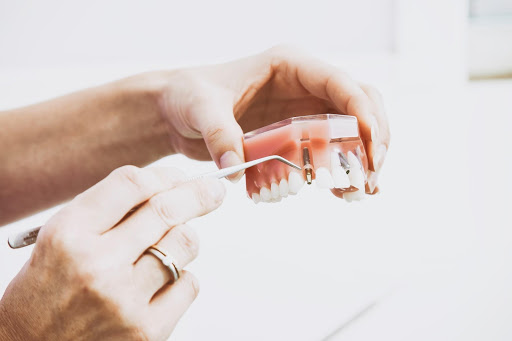

HEALTHY TEETH: MYTHS VS FACTS

Oral health is often overlooked and misunderstood because we fail to understand its importance. When it comes to taking care of our teeth and gums, we tend to believe in hearsay rather than consulting the dentist. This harms our teeth and gives way to many oral diseases.
In this article, we have debunked some of the most common dental care myths.
Myth 1: Scaling the teeth weakens them.
Fact: Cleaning and scaling the teeth removes deposits from the teeth and gums, it keeps them clean and healthy. The removal of calculus prevents the loss of bone around the teeth. This prevents the problem of bad breath and gum bleeding. Getting your teeth and gums cleaned by a dentist is beneficial for healthy teeth and gums.
Myth 2: Only sugar causes cavities.
Fact: Tooth decay can be caused by any carbohydrate intake and not just sugar. Cavities occur when bacteria produce acid in the mouth. Avoiding refined food and deep-fried food is important when aiming to stop the development of cavities. Opting to eat teeth-friendly food such as nuts and vegetables is a safer option.
Myth 3: Diet soda doesn’t cause your teeth any harm.
Fact: Sodas are highly acidic, this high acid content of carbonated drinks act as fuel for the acid-loving bacteria in your mouth. Sugar-free carbonated drinks can cause just as much damage to your teeth as sugary drinks do. The pH of diet soda is 2-3 and that of water is pH 7, soda eats away at your teeth enamel. This leads to higher sensitivity, cavities, and eventual tooth loss.
Myth 4: Children’s teeth are impermanent milk teeth and do not need any treatment.
Fact: Milk teeth in children act as space maintainers and as guides for their permanent successors in their proper position. If children don’t get regular dental checkups they might have tooth developmental issues and underlying conditions which are left undiagnosed. Oral infections often don’t leave with the falling out of milk teeth and may be carried on by permanent teeth as well, which makes it even more important to treat children for tooth decay.
Myth 5: Wisdom teeth must be removed.
Fact: All wisdom teeth do not need to be removed, as long as they can erupt and function in perfect health without causing any pain or crowding. Though it is advisable to go for a routine check-up when you see the first signs of wisdom teeth coming out.
Myth 6: Smoking simply stains the teeth and doesn’t cause any major harm.
Fact: Smoking is a major cause of tooth decay. Smokers have more chances of developing tooth decay than non-smokers, along with that they also have more chances of developing gum disease and risk of oral cancer. Smoking causes inflammation of the gums, very bad breath, dry mouth, staining of teeth and loss of teeth gripping. It is best to avoid smoking at all costs.
Myth 7: You can brush whenever you want to.
Fact: It is recommended to set a strict routine for brushing your teeth. One must brush at least twice daily, in the morning and at night. It is very important to brush at night before you go to sleep because at night your mouth produces less saliva when you sleep and any leftover food particles can be potential fuel for mouth bacteria to produce acid and degrade the tooth enamel. Also, make sure to brush your teeth and gargle after a heavy meal. Brush with fluoridated toothpaste as that helps prevent the formation of plaques.
Myth 8: A hard toothbrush is more effective than a soft one.
Fact: A hard toothbrush can be very abrasive and using them too vigorously might result in the removal of the surface area of teeth. A soft toothbrush if used properly can be just as effective at cleaning your teeth without the risk of enamel loss.
Myth 9: Flossing creates spaces between your teeth.
Fact: Flossing does not create any extra space between your teeth! It helps remove food debris nestled inside the spaces between your teeth and gums. This, in turn, helps prevent tooth decay by keeping your teeth clean, healthy and free of harmful bacteria. When you start flossing for the first time they might be some slight bleeding, do not be alarmed after a few tries the bleeding ceases. If the bleeding continues even after a few turns then you should stop flossing and consult your dentist for further instructions.
Myth 10: You should not have any dental treatment done during pregnancy.
Fact: It is very important to go through regular dental check-ups when you are pregnant. Inform your dental healthcare professional that you are pregnant before booking an appointment. Such regular check-ups will help prevent any problems which might hamper the absorption of nutrition and identification of any oral infection which might hamper the growth of the baby. Care will be taken that any dental treatment done during pregnancy shall not be harmful to the developing baby.
Myth 11: Oral health is not connected to the health of the rest of your body.
Fact: There are many correlations between your oral health and systemic (overall) health. A mouth affected by periodontal disease can cause the infection to spread to the rest of the body. You have to take care of your overall health and make sure to eat nutritious food with all the major food groups.
Myth 12: You need to visit the dentist only when your teeth hurt.
Fact: This is the biggest mistake we all make when it comes to dental health. You must visit the dentist for regular check-ups, the frequency of which is dictated by your dental health practitioner. Because of frequent check-ups you will always be up to date with your oral health and will be able to treat any diseases at the preliminary stages when there is less treatment required.
Related blog: How are tooth-colored fillings better than metal?














